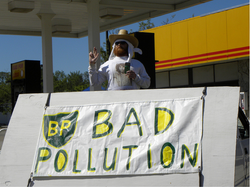154 groups urge feds to act on post-BP disaster health crisis
 A coalition of 154 organizations sent a letter yesterday to the heads of the U.S. Environmental Protection Agency and the Department of Health and Human Services, asking them to take immediate action to address the public health crisis on the Gulf Coast triggered by last year's BP oil spill.
A coalition of 154 organizations sent a letter yesterday to the heads of the U.S. Environmental Protection Agency and the Department of Health and Human Services, asking them to take immediate action to address the public health crisis on the Gulf Coast triggered by last year's BP oil spill.The groups that are part of the coalition include public health, environmental and fisher advocates from across the United States, as well as faith-based organizations.
"We believe action must be taken immediately to help the people of the Gulf coast who are currently suffering health impacts and those who will become ill because of the continuing impacts of the BP oil disaster," the letter stated.
The groups are asking EPA Administrator Lisa Jackson and HHS Secretary Kathleen Sebelius to create a Gulf Coast Health Restoration Task Force including members of the affected communities.
They are also calling for implementing the national oil spill commission's health recommendations. Noting that current law lacks the ability to address health hazards from oil spills, the commission's final report called for long-term tracking of responders' health and community health in affected areas. But it also said that such research "cannot overshadow the need to provide immediate medical assistance to affected communities."
In addition, the letter called on the agencies to publish data sheets on health effects from mixing oil and chemical dispersants as well as any other products used in response to the spill, and to comprehensively restore the region's health, economy and environment.
As Facing South reported in "Poisoned in the Gulf," our recent week-long investigative series on the post-BP spill health crisis, there are widespread accounts from throughout the region of health problems linked to the disaster, which resulted in the release of some 200 million gallons of crude oil into the Gulf as well as the spraying of almost 2 million gallons of chemical dispersants, both of which are known to damage human health.
Among the symptoms being reported by oil cleanup workers and residents of coastal communities are respiratory and gastrointestinal disorders, vision and memory problems, skin conditions, and bleeding from the rectum and ears.
"This was an unprecedented environmental disaster with never-before-seen quantities of toxic crude oil and dispersants released into our Gulf environments," said Lower Mississippi Riverkeeper Paul Orr. "It is unfathomable that the government has not yet acted to help those that have become ill."
(Photo of BP oil spill protest by Fibonacci Blue via Flickr.)
Tags
Sue Sturgis
Sue is the former editorial director of Facing South and the Institute for Southern Studies.
